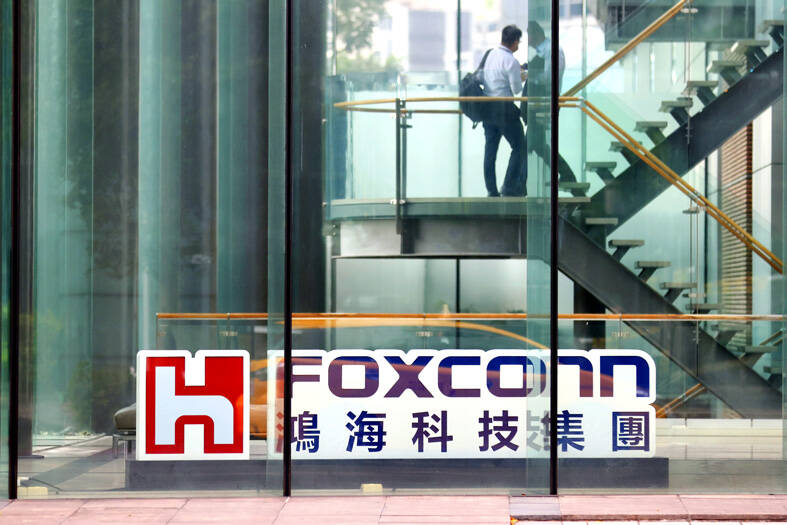Hon Hai Precision Industry Co (鴻海精密) has signed an agreement on launch services with Germany’s Exolaunch GmbH regarding mission management, orbital deployment hardware and other relevant services for its first-ever satellites, the key Apple Inc manufacturing partner said yesterday.
Exolaunch is a global provider of small satellite mission management and deployment services, Hon Hai said in a statement. The Berlin-based firm has helped deploy 325 satellites into orbit, including 250 cubesats and 75 microsatellites, using its proprietary deployment technologies on the most frequent and reliable launch vehicles on the market, it said.
Hon Hai is planning to launch two low Earth orbit (LEO) satellites, named PEARL-1H and PEARL-1C, via Space Exploration Technologies Corp’s (SpaceX) Falcon 9 rocket during the Transporter 9 mission.

Photo: Ritchie B. Tongo, EPA-EFE
According to the launch schedule posted on the SpaceFlight Now site, the Transporter 9 mission is to take place at Vandenberg Space Force Base in California on Nov. 9 US time.
“This is a pilot run as proof of the concept for our efforts in LEO satellite broadband communications and next-gen, beyond 5G (B5G) capabilities,” the Hon Hai Research Institute’s Next-Generation Communications Research Center director Wu Jen-ming (吳仁銘) said in the statement.
“Exolaunch plays a crucial role in getting our mission to space,” Wu said.
Hon Hai senior director for B5G satellite communications Jesse Chao (趙元瀚) expects LEO satellites to become ever more cost-competitive and convenient during the B5G and new space era.
“The company’s first PEARL is meant to show we will be ready to meet the increase in demand for key components, sub-systems, and assembly integration tests, driving higher circulation and innovation in the new space industry,” Chao said.

MULTIFACETED: A task force has analyzed possible scenarios and created responses to assist domestic industries in dealing with US tariffs, the economics minister said The Executive Yuan is tomorrow to announce countermeasures to US President Donald Trump’s planned reciprocal tariffs, although the details of the plan would not be made public until Monday next week, Minister of Economic Affairs J.W. Kuo (郭智輝) said yesterday. The Cabinet established an economic and trade task force in November last year to deal with US trade and tariff related issues, Kuo told reporters outside the legislature in Taipei. The task force has been analyzing and evaluating all kinds of scenarios to identify suitable responses and determine how best to assist domestic industries in managing the effects of Trump’s tariffs, he

TIGHT-LIPPED: UMC said it had no merger plans at the moment, after Nikkei Asia reported that the firm and GlobalFoundries were considering restarting merger talks United Microelectronics Corp (UMC, 聯電), the world’s No. 4 contract chipmaker, yesterday launched a new US$5 billion 12-inch chip factory in Singapore as part of its latest effort to diversify its manufacturing footprint amid growing geopolitical risks. The new factory, adjacent to UMC’s existing Singapore fab in the Pasir Res Wafer Fab Park, is scheduled to enter volume production next year, utilizing mature 22-nanometer and 28-nanometer process technologies, UMC said in a statement. The company plans to invest US$5 billion during the first phase of the new fab, which would have an installed capacity of 30,000 12-inch wafers per month, it said. The

Taiwan’s official purchasing managers’ index (PMI) last month rose 0.2 percentage points to 54.2, in a second consecutive month of expansion, thanks to front-loading demand intended to avoid potential US tariff hikes, the Chung-Hua Institution for Economic Research (CIER, 中華經濟研究院) said yesterday. While short-term demand appeared robust, uncertainties rose due to US President Donald Trump’s unpredictable trade policy, CIER president Lien Hsien-ming (連賢明) told a news conference in Taipei. Taiwan’s economy this year would be characterized by high-level fluctuations and the volatility would be wilder than most expect, Lien said Demand for electronics, particularly semiconductors, continues to benefit from US technology giants’ effort

‘SWASTICAR’: Tesla CEO Elon Musk’s close association with Donald Trump has prompted opponents to brand him a ‘Nazi’ and resulted in a dramatic drop in sales Demonstrators descended on Tesla Inc dealerships across the US, and in Europe and Canada on Saturday to protest company chief Elon Musk, who has amassed extraordinary power as a top adviser to US President Donald Trump. Waving signs with messages such as “Musk is stealing our money” and “Reclaim our country,” the protests largely took place peacefully following fiery episodes of vandalism on Tesla vehicles, dealerships and other facilities in recent weeks that US officials have denounced as terrorism. Hundreds rallied on Saturday outside the Tesla dealership in Manhattan. Some blasted Musk, the world’s richest man, while others demanded the shuttering of his